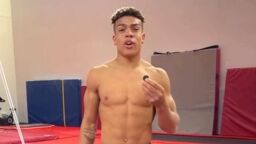While coming out is uniquely personal and often complex experience, coming out as an athlete can have its own additional challenges. In the wake of the horrifying events from the Olympic Games in Rio with regard to The Daily Beast and Nico Hines' use of Grindr to ‘out' athletes, I wanted to share my story of sports and the truly personal coming out process.
In my athletics career I have had two developmental milestones. One was as a closeted elite gymnast, and the second is as an out rugby player. Each experience has shaped who I am as both an athlete and a gay man, and I could not imagine my life and identity unfolding in any other way.
One of my favorite events in gymnastics was vault. Long before I was performing this event for the Stanford men's gymnastics team, I was about 3 years old and running full speed across the living room to catapult myself over my dad's bent knees, tumbling down his legs anding land on his stomach in a fit of laughter.
By the age of 7 I had stopped all the ‘traditional' sports of basketball, baseball and soccer to focus on gymnastics. I loved everything about the sport: being able to flip and fly through the air, the precision and strength, and the combination of speed, power, and fearlessness.
There was an element of fear within gymnastics that became more of a challenge as I grew up: the fear of my sexual orientation. Men's gymnastics in high school is largely a club sport, with very few men on any given team. For the majority of my high school career there were only a couple of other gymnasts in my age group, but we were never large enough to competed regularly as a team.
This individual aspect of the sport became more isolating as I started to question my sexual orientation. I felt more alone on the competition floor, and there was a growing awkwardness and discomfort with other gymnasts when we would hang out after competitions, where the conversation revolved largely around girls.
 Must Reads
Must Reads 
I have a gay uncle in my family, so I have grown up with an acceptance of this my entire life. Yet there was still something very personal holding me back from coming out. Being in Missouri and central Pennsylvania without any gay social or online outlets was a contributing factor, but even when I moved to Stanford for college I was still not ready to come to terms with my sexuality.
Competing for the Stanford men's gymnastics team was a dream. Not only was the level of gymnastics and competition incredible, but also I finally had a team to compete with. Even though Stanford and the team could not have been a more welcoming and accepting environment in which to come out, I still could not admit to myself or anyone that I was gay. Wrist surgery forced me to medically retire from the sport, and at the end of my sophomore year I finally came out to my best friend and family.
It took me being forced to leave gymnastics, a sport I had loved and competed in nearly my entire life, to have the identity shift and life change to accept who I truly was. Neither my open-minded family, supportive college, nor incredible gymnastics teammates could give me this change. It had to come from me, and in my own time.
In many ways, it is a shame that I never got to compete at the elite level as an out gymnast. I feel like this visibility is important for LGBT athletes in all sports. However, I couldn't do that until I was ready, until I felt safe and comfortable with who I am, and it was not something that anyone or any journalist should be able to force or invade.
After living as an out gay man throughout medical school and residency, I found myself about 10 years after retiring from gymnastics with the craving for competitive sports in my life. After completing my professional training I finally had some time to rediscover my identity as an athlete.
At first glance, rugby does not seem like a logical transition from gymnastics. Yet it is a sport that always appealed to me as fiercely competitive, physically demonstrative, and with an intense team atmosphere. It has often been described as a ‘beastly game played by gentlemen.' When I found a gay-inclusive rugby team in San Francisco, I actually became more anxious. I was about to embark on an athletic adventure. Not only was I physically out of shape, but it was going to be an emotional and mental experiment for me to be gay and play a sport with other gay men. What would this be like? What if they didn't like me? Or worse, what if I sucked?
My fears of rugby quickly dissipated. The San Francisco Fog Rugby Club not only welcomed me as a rookie member, but the teammates have become the kind of athletic team I have always wanted. There is competition and fun on the pitch, while at the same time there is gayness and a camaraderie that is open and at ease with people's uniqueness. It is not just about being gay, as not everyone on the team is gay. Being on the team is about being yourself and having teammates who understand and celebrate that.
For the first time in my life, I am competing in a sport feeling like a complete member of a team.
As a physician, I am aware of the increased mental health, substance abuse, and other health issues facing our community, in part due to the stress of isolation. Sports have the unique capacity to help alleviate these issues. They can provide people with a sense of direction and empower them.
I felt that sense of empowerment as a gymnast, but it wasn't until I was able to come out and be a rugby player that I have felt the sense of belonging and community. This process could not have happened through any other time or in any other way, and I believe we have to support all LGBT athletes, especially with silent and respectful support for those who have not - for the sake of what country they are from - enjoyed their true identities in their athletic existence.
You can find Bryan McColgan on Facebook. He is also on Twitter @BryanMcColgan. He is also on email at [email protected].
Edited by Cyd Zeigler







































